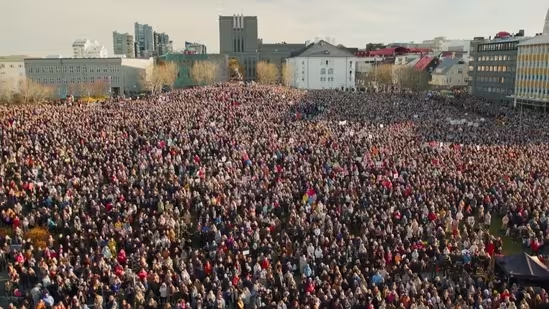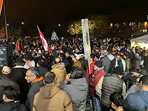Women in Iceland, world's most gender-equal country, protest for equal pay | Explained
Iceland, the world's most gender-equal country, on Tuesday, saw women including Prime Minister Katrín Jakobsdóttir go on strike from midnight to midnight demanding an end to unequal pay and gender-based violence.

Tens of thousands of women refused to work on Tuesday, which was called the ‘kvennafrí’ in Icelandish or the women's day off.
We're now on WhatsApp. Click to join.Speaking to mbl.in ahead of the protest, the PM said, “I will not work this day, as I expect all the women [in cabinet] will do as well.”
Iceland, with a population of 380,000, has been ranked the world's most gender-equal country for 14 years in a row by the World Economic Forum (WEF), which measures education, pay, healthcare and other factors.
Why did women strike in Iceland?
Iceland is the most gender-equal country, however, WEF has assigned it a score of 91.2 per cent. No nation has been able to achieve complete equality in terms of the gender pay gap and there remains a gap in Iceland too.
Jakobsdóttir told mbl.in, “We have not yet reached our goals of full gender equality and we are still tackling the gender-based wage gap, which is unacceptable in 2023. We are still tackling gender-based violence, which has been a priority for my government to tackle.”
A University of Iceland study has found that 40 per cent of women in the country face gender-based violence at least once in their lifetime.
While women in Iceland have broken glass ceilings and have acquired top roles — from bishops to top government positions — the lowest-paying jobs in the volcanic island nation like cleaning and child care are also women-dominated.
The work also depends upon immigrants, since Iceland is a tourism-dominated economy. However, most foreigners work longer hours and take home lesser salaries. About 22 per cent of women workforce in Iceland is foreign-born, Statistics Iceland states.
Tuesday's protest was the largest in Iceland since October 24, 1975, when 90 per cent of the women refused to work, clean or look after children to protest against discrimination at the workplace.
The country's trade unions organised the strike and asked women and non-binary people to refuse paid and unpaid work, including daily chores. Around 90 per cent of women in Iceland belong to a union.
The organiser of the protest, Kristín Ástgeirsdóttir, told BBC that the violence against women remains high despite high gender equality.
Ástgeirsdóttir said, “The theory was that the more gender equality, the less violence. That unfortunately does not seem to be the case. Violence against women is deeply rooted in our culture.”
One of the strike organisers Freyja Steingrimsdottir told Reuters, “We're seeking to bring attention to the fact that we're called an equality paradise, but there are still gender disparities and urgent need for action.”
In the world for economic participation, Iceland ranks 14th — below Norway, Jamaica and Liberia.
The strike's effect
Local media reports said that around 70,000-100,000 people were attending the strike.
Education and healthcare, the two women-dominated jobs in Iceland, were significantly affected on Tuesday.
Schools, shops, banks and famous swimming pools of Iceland were shut on Tuesday.
All-male news teams also announced shutdowns across the nation. Iceland's national broadcaster RUV said that it was reducing TV and radio broadcasts for the day.
Public transport was delayed, hospitals remained understaffed and hotel rooms were left uncleaned. RUV also reported that only one bank branch in the entire country was open.
Disclaimer: The copyright of this article belongs to the original author. Reposting this article is solely for the purpose of information dissemination and does not constitute any investment advice. If there is any infringement, please contact us immediately. We will make corrections or deletions as necessary. Thank you.
Title:Women in Iceland, world's most gender-equal country, protest for equal pay | Explained
Url:https://www.investsfocus.com









